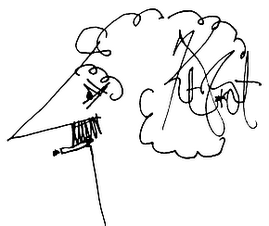Excerpt from Dan Wakefield's tribute to Vonnegut
Sam Lawrence started his publishing enterprise (Seymour Lawrence Inc., founded with his wife, Merloyd ) in 1965, and a year later he wrote a fan letter to a little-known author named Kurt Vonnegut Jr. Sam had liked the style and humor of a book review Vonnegut had written for The New York Times, and he had also heard murmurings of a kind of underground admiration for the author's off beat paperback novels from a number of young people, mostly college students. He told the author to come by and see him if he ever needed a new publisher. A few months later a tall, thin, tousle-haired fellow with a shaggy mustache knocked on the door of Lawrence's one-room office at 90 Beacon St . He announced himself as Kurt Vonnegut and said he was looking for a publisher.
From: The Boston Globe
Open-hearted in fiction and friendship
By Dan Wakefield | April 29, 2007
A plain-spoken, Mid western man, Vonnegut explained that his previous three publishers had turned down his new novel, but that Lawrence was welcome to read it and judge for himself. A few days later Lawrence called Vonnegut back to his office and told him he not only wanted to publish the new novel, he wanted to give the author a multiple book contract for both hardcover and paperback rights that was a publishing windfall at the time. Vonnegut warned Lawrence that his books "didn't make money"; his last one had sold only 1,500 copies. Lawrence was not deterred. "You write the books," he told the author, "and I'll worry about the money."
The first of the three books -- the one his other publishers had turned down -- was "Slaughterhouse - Five. " It was based on Vonnegut's experience in World War II as an American infantryman and German prisoner of war who endured the fire bombing of Dresden with other POWs in an underground meat locker. Unlike any other "war novel," this one had no shred of glory, heroics, or nobility; no potential movie role for John Wayne. There was only the madness and suffering of mutual destruction, the clownish behavior of mortals seen through a dark, ironic lens, lightened with escapes of "time travel" by the principal character, the hapless Billy Pilgrim, to a post war world of Rotarian consumerism, as well as transport by UFO to a planet called Tralfamadore. The Tralfamadorians were wiser than earthlings, whose mating habits they studied in zoos. The books of the Tralfamadorians were tiny ("a dozen of them might have had the bulk of ' Valley of the Dolls' ") and were arranged in "brief clumps of symbols separated by stars." Vonnegut separated brief sections of his own books with asterisks. He often interspersed as commentary the phrase "So it goes."
"Slaughterhouse - Five" became a best seller, and Vonnegut's work came out from underground. Since then, until his death on April 11, Vonnegut turned out eight more novels, three short-story collections, four plays, and five books of essays and interviews.
So it goes.
* * *
Long before he became famous, I heard about Kurt Vonnegut Jr. when I went to Shortridge High School, his alma mater in Indianapolis. He was an editor of The Shortridge Daily Echo, our high school newspaper, 10 years before I landed such a position in my senior year. I heard that he wrote short stories, some of which were soon to appear in popular magazines of the '40s and '50s like Colliers and The Saturday Evening Post, where writers as distinguished as F. Scott Fitzgerald and John O'Hara had published their work. The fact that someone from my own high school had achieved such literary heights gave me hope that I, too, might someday become a writer. Little did I imagine that Vonnegut would be instrumental in helping me achieve my dream of publishing a novel.
Soon after graduating from Columbia in 1955, I began writing articles for magazines like The Nation and Esquire. I published several journalistic books, but my attempts at a novel hadn't panned out. I mailed one of my non fiction books, "Between the Lines , " to Vonnegut with a letter of esteem for his work; I also mentioned our common background in high school. He wrote back a funny and sympathetic letter, comparing some of his own foiled efforts at athletic prowess with the story of my failure to break the "seven-minute mile" -- a time that many grandmothers could have surpassed.
When I met him for the first time in Cambridge in 1963, I was not disappointed. Vonnegut was as good in person as he was on the page -- funny, wry, open, direct. I was at Harvard for the year on a Nieman Fellowship in journalism while Vonnegut was living in Barnstable. I don't know whether this was during his incarnation there as a teacher of emotionally disturbed children, writer for an ad agency, or the first Saab automobile salesman in America -- jobs he took to supplement his income as a writer and raise his three children as well as the three children of his sister, who had died of cancer a day after her husband was killed in a train wreck.
So it goes.
* * *
"Is it all right if I show your novel to Vonnegut?" Sam Lawrence asked me. "If he likes it, that would help a lot when I present the book to Delacorte."
I had finally finished that long-awaited (by me, if no one else) novel in 1969, and Sam wanted to publish it -- he needed, however, the backing of Delacorte/Dell in New York, which brought out a list with his imprint: "A Seymour Lawrence Book." Though I had corresponded with Vonnegut a few times after that meeting in Cambridge, I hardly knew him personally, nor did I have any idea of what he would think of a novel like mine, which was nothing like his own work, either in style or substance. I said OK, and crossed my fingers.
A week or so later, Sam called to read me a telegram he'd just received from Vonnegut after he'd read my novel: "You must publish this important book; get this boy in our stable." As if that weren't enough, when the book was published, Vonnegut reviewed it in Life magazine. He confessed that we were friends, and had the same publisher, and had gone to the same high school: "So I would praise his first novel, even if it were putrid. But I wouldn't give my Word of Honor that it was good." He gave his Word of Honor. That book hit the Time magazine best seller list.
So it goes.
* * *
Because of that novel and several others, I got the call to Hollywood in 1977, and created a TV series called "James at 15." I succumbed to most of LA's fabled and nearly fatal elements before returning to Boston in 1980, just in time to save my mental and physical health. In recovery, I went back to church for the first time since high school, becoming an active member of King's Chapel, one of the few Christian churches in the Unitarian-Universalist Association. I attended a UUA General Assembly at which Kurt Vonnegut was the keynote speaker. Like most Unitarians, Vonnegut was a non-Christian humanist; he wore a pin on his lapel that expressed his feeling about most organized religion. It was a picture of a frankfurter with an X over it; Vonnegut explained that it meant " no baloney."
When I published an article in The New York Times Magazine called "Returning to Church" in 1985, describing my return to the Christianity of my childhood, I got home to find a message on my answering machine.
"This is Kurt," said the voice of Vonnegut. "I forgive you."
My becoming a Christian again in midlife and Vonnegut's humanist view became a running -- and always good-natured -- series of jibes between us. Several decades after his message of forgiveness, Vonnegut published a poem in The New Yorker. I sent him a postcard (he refused to use a computer, much less e-mail) that said "I see you've become a poet. I forgive you."
I got back a postcard from him that read "Not as bad as you becoming a Christian!"
He sometimes slipped from his humanist stance, however, even after becoming honorary president of the Humanist Association. He told me with a smoky cough and laugh between his Pall Malls that he really messed up while giving a eulogy about a fellow humanist, the science fiction writer Isaac A simov.
"I was speaking to the Humanist Society," he told me, "and I said I was sure that Asimov must be in heaven now." He coughed, chuckled, and said "I forgot."
In fact Vonnegut spoke of Jesus Christ in his writing with more understanding and sensitivity than many theologian s . In "Slaughterhouse-Five" Billy Pilgrim endures much that Vonnegut endured as a prisoner of war, and toward the end of the book the narrator says "Billy cried very little, though he often saw things worth crying about, and in that respect, at least, he resembled the Christ of the carol: 'The cattle are lowing, / The Baby awakes , / But the little Lord Jesus, / No crying he makes.' " Those words of the carol are the epigraph of the book.
Vonnegut commented on my most recent book, "The Hijacking of Jesus," that I had written about "the capturing of Jesus Christ as a totem for a few powerful Americans, intent on becoming powerful all over the world, and by violent and corrupt means which are anything but Christ-like."
Deeply disturbed and disillusioned by the war in Iraq, Vonnegut told me two years ago that the reason he stopped writing was that "I believe my writing always had hope, and there was pride in my country. I don't feel that any more."
So it goes.
* * *
In recent years Vonnegut turned from writing to drawing and painting. I have several of his beautiful drawings in my office. He recently created artworks like posters, one of which he sent to me with a drawing of a golden flower and the inscription "A new Beatitude for my Christian friend Dan." In large blue letters it read "Blessed are the Happy-Go-Lucky Girls and Boys."
I called to thank him and ask where he got that phrasing and what exactly it meant. He told me he had never liked the beatitude that says "Blessed are the meek," because " it reminded me of a bunch of 'hang dog' kind of people, which I didn't much like. Then I found a French Bible where the translation, instead of 'meek,' uses the French word 'debonair.' I translated that as 'Blessed are the happy-go-lucky.' "
Blessed be Vonnegut. He blessed us all.
Dan Wakefield's recent books include "The Hijacking of Jesus" and "Spiritually Incorrect."
Sunday, April 29, 2007
Subscribe to:
Post Comments (Atom)


No comments:
Post a Comment